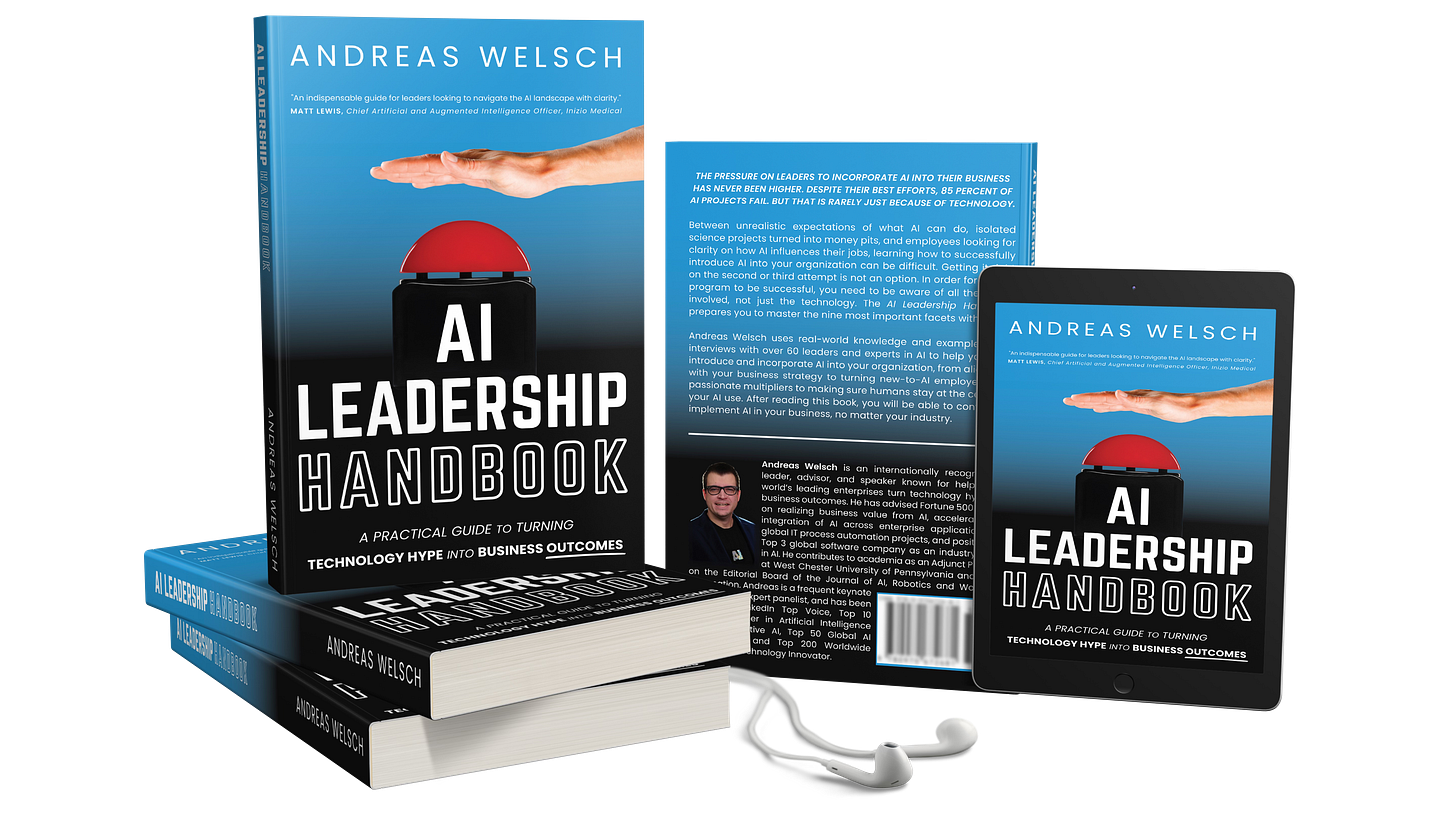How AI Is Accelerating Industry Disruption And Leadership
A First-Hand Example of the Rapid AI Adoption for Audiobook Narration Across Platforms
If you follow the tech news, there’s no way around the claims of disruption: industries, jobs, tasks—everything is going to change massively. But most likely, it’s not the case in your own area of influence. Change seems to happen at a much slower pace than management consultants make it appear. But does it?
At the end of last year, I shared my experience creating the AI-narrated version of my book, AI Leadership Handbook. I had previously recorded about 45 minutes of myself reading blog posts to create a voice clone using an AI tool called ElevenLabs. My family and friends couldn’t tell the difference between my voice clone and my own voice. Yes, that’s how good the technology is. Since then, things have moved incredibly quickly in this space.
When Industry Heavyweights Move Quickly
The industry is moving incredibly fast and evolving from a human-only to an AI-embraced approach to narration. Just because progress seemed slow doesn’t mean that the pace can’t change in a short period of time and in your industry, too:
December 2024: Rakuten Kobo was the only distributor to accept AI-narrated audiobooks created using AI tools outside the distributor’s platform, such as the author’s voice clone. Findaway Voices by Spotify allowed AI-generated narration using stock voices, and Amazon/ Audible had a close beta program using AI voices provided via their platform.
January 2025: Audiobooks.com was the second platform to accept AI-narrated audiobooks using outside technology.
February 2025: Findaway Voices by Spotify announced a partnership with ElevenLabs as part of which authors can create the audiobook using their own voice clone and distribute the AI-narrated audiobook via Spotify. The distribution includes additional platforms, including Barnes & Noble, Kobo, and audiobooks.com.
March 2025: Amazon/ Audible expands its Virtual Voices beta program. Authors can now narrate their Kindle-based ebook using stock voices.
With every new platform opening up to AI-narrated books, I have added the AI Leadership Handbook for distribution there. As of the publication of this article, the audiobook is available on the following platforms (from least to most realistic narration):
Amazon/ Audible — Stock voice
Spotify/ Barnes & Noble — Andreas’s voice clone
Audiobooks.com/ Kobo — Andreas’s voice clone + Matt’s voice clone for the forward
So, why care about Amazon’s approach? More on that in the next section…
Listen to the Audiobook: AI Leadership Handbook
Andreas Welsch uses real-world knowledge and examples from interviews with over 60 leaders and experts in AI to help you both introduce and incorporate AI into your organization, from aligning it with your business strategy to turning new-to-AI employees into passionate multipliers to making sure humans stay at the center of your AI use. After listening to this audiobook, you will be able to confidently implement AI in your business, no matter your industry.
How Platforms are Approaching AI Narration
In my opinion, Spotify is the best option and has a solid strategy. Their partnership with ElevenLabs ensures authors can use the best voice generation technology in the market and choose to create or use their own voice clone. At $99 for a one-month subscription to ElevenLabs, it offers unbeatable quality and maximum authenticity at a reasonable price (compared to several thousand dollars for a human-narrated audiobook). Here’s a sample using my voice clone:
Amazon/ Audible is taking a different approach. Currently, readers of the ebook edition can buy the audiobook for an additional $1.99 or buy the audiobook stand-alone for $14.99. Amazon’s value proposition is the ability to seamlessly switch between the ebook and the audiobook edition and vice versa without scrolling or fast-forwarding. There is no additional cost for authors to narrate their book using AI using Amazon/ Audible.
But there are some drawbacks:
Authors can currently only choose from stock voices, which can sound quite robotic at times, like your cable provider’s automated phone system. Spotify/ ElevenLabs are far ahead in terms of quality and authenticity!
Footnotes, image captions, etc., do not lend themselves well to narration. Authors cannot adapt their manuscript for an audio format on Amazon/ Audible, such as replacing tables and visuals with a text paragraph that instead explains the item. (That’s likely because of the seamless switching between editions.) Spotify/ ElevenLabs do allow authors to edit the manuscript, which makes for a much better flow and listener experience.
So why publish an audiobook on Amazon/ Audible right now?
From Market Dominance, Dynamics, and Lessons Learned
Amazon/ Audible owns 40% of the audiobook market. (Let that sink in for a moment.) So, yes, making the AI Leadership Handbook available as an audiobook on that platform is a no-brainer. Also, since I’ve used ElevenLabs to narrate my book, I wanted to compare the experience as an author, publisher, and listener.
I’m genuinely curious about a few things:
To what degree do listeners care who narrates the audiobook—the author, a voice actor, an author’s AI voice clone, or an AI stock voice?
How important is the ability to seamlessly switch between the ebook and audiobook editions?
What effect does a rather robotic-sounding narration have on the listeners' perception of the book and the platform? If the first experience was underwhelming, how likely are listeners to buy another AI-narrated audiobook on Amazon/ Audible?
In my view, the last point is the most impactful one for any product or service we create or consume:
Is it about putting the AI label on a product, riding the AI wave, and keeping pace with the competition?
Is it about putting a product on the market (even if it’s a beta version) that is subpar to completion for the sake of having a product in the market?
How does market dominance influence adoption?
Conclusion
What’s clear from all this: AI adoption in products and business models is happening much faster than we might imagine. What seemed like a distant future 3 months ago is already a reality by now.
These are far-reaching consequences for those who earn their living as professional voice actors and narrators. (I explored some of these aspects in my initial post.) But it also creates tremendous opportunities for those who have previously not had access to professional narrators. It also creates tremendous opportunities for the largest companies on the planet to expand their business models and revenue streams in a market they already dominate. And finally, it might also further accelerate the generation of mediocre experiences and content at scale.
If anything, it challenges us to experiment and form our own opinions—something we need to practice more as we delegate more tasks to AI.
What’s the most important criterion when you listen to audiobooks?
Explore related articles
Become an AI Leader
Join my bi-weekly live stream and podcast for leaders and hands-on practitioners. Each episode features a different guest who shares their AI journey and actionable insights. Learn from your peers how you can lead artificial intelligence, agentic AI, generative AI & automation in business with confidence.
Join us live
May 06 - Maxim Ioffe (Director, Global IA CoE at WESCO) will discuss setting AI governance programs between IT and the business.
May 13 - Leah Tharin (B2B Product & Growth Leader) will be on the show to talk about product-led growth of Agentic AI products.
May 28 - Barr Moses (CEO & Co-Founder of Monte Carlo) will provide insights into having reliable data for AI and Agentic AI projects.
Watch the latest episodes or listen to the podcast
Follow me on LinkedIn for daily posts about how you can lead AI in business with confidence. Activate notifications (🔔) and never miss an update.
Together, let’s turn hype into outcome. 👍🏻
—Andreas










Really enjoyed this, thanks for sharing! I tried ElevenLabs too, and totally agree, the tech is shockingly accurate.